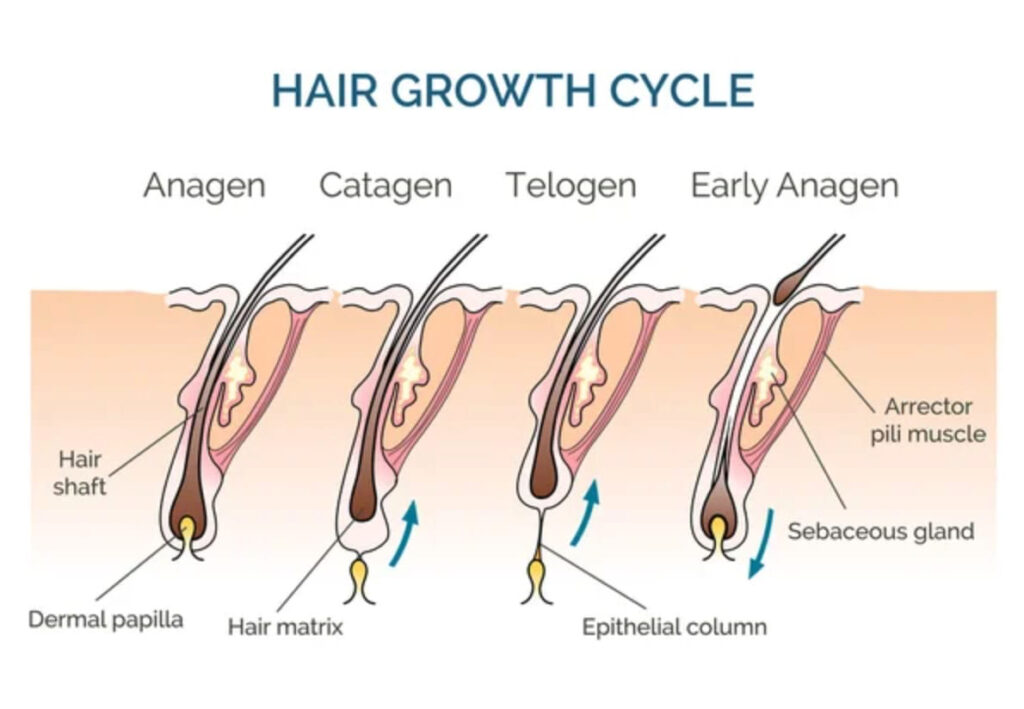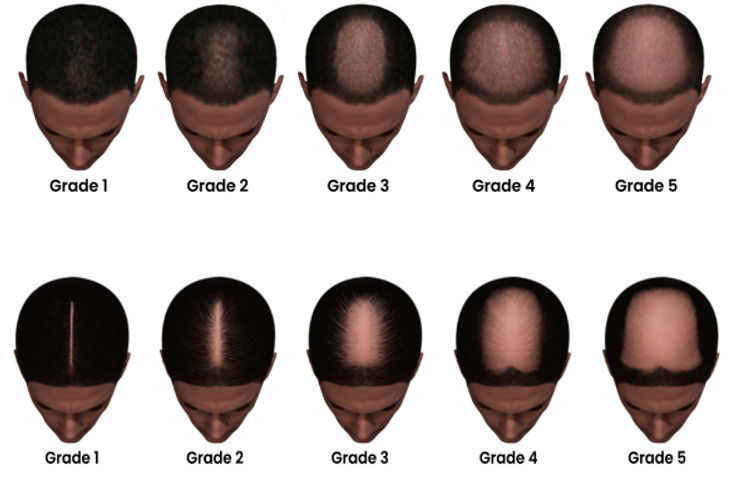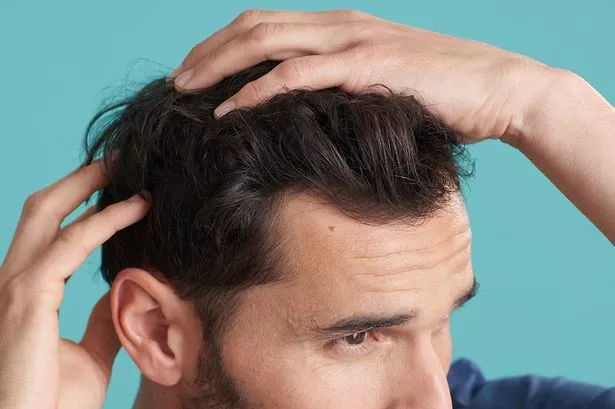Hair fall is a common problem that affects both men and women. Losing a few strands of hair every day is normal, but when hair loss becomes excessive and noticeable, it can be a cause for concern. In this comprehensive guide of hair fall treatment we will explore the various causes of hair fall and provide effective treatment options to help you regain healthy and voluminous hair.

Table of Contents
Effective Hair Fall Treatment
1. Understanding Hair Growth Cycle
To understand hair fall, it’s essential to grasp the hair growth cycle. Hair goes through three distinct phases: anagen (growth phase), catagen (transition phase), and telogen (resting phase). During the anagen phase, hair actively grows for a period of two to eight years. The catagen phase marks a brief transition period, while the telogen phase is when the hair rests for approximately two to four months before shedding naturally.

2. Types of Hair Loss
Hair loss can manifest in different forms, each with its own characteristics and causes. The most common types include androgenetic alopecia, alopecia areata, and telogen effluvium.
Androgenetic Alopecia
Androgenetic alopecia, also known as male or female pattern baldness, is the most prevalent type of hair loss. It is usually hereditary and results in gradual thinning of hair over time. In men, it typically starts with a receding hairline and balding at the crown, while women experience diffuse hair thinning on the top of the head.
Alopecia Areata
Alopecia areata is an autoimmune condition where the immune system mistakenly attacks the hair follicles, leading to patchy hair loss. It can occur at any age and may result in complete baldness in severe cases.
Telogen Effluvium
Telogen effluvium is characterized by excessive shedding of hair due to a disruption in the hair growth cycle. It can be triggered by factors such as physical or emotional stress, hormonal changes, nutritional deficiencies, or certain medications. Telogen effluvium often resolves on its own once the underlying cause is addressed.

3. Common Causes of Hair Fall
Hair fall can be attributed to various factors, including genetics, hormonal imbalances, medical conditions, nutritional deficiencies, and stress.
Genetics
Family history plays a significant role in determining the likelihood of experiencing hair loss. If your parents or close relatives have a history of hair fall, you may be more prone to it.
Hormonal Imbalances
Hormonal imbalances, such as those occurring during pregnancy, childbirth, menopause, or thyroid disorders, can disrupt the hair growth cycle and lead to hair fall.
Medical Conditions
Certain medical conditions like scalp infections, autoimmune disorders, and underlying health issues can contribute to hair loss. It is crucial to address these conditions to prevent further hair fall.
Nutritional Deficiencies
Inadequate intake of essential nutrients like iron, zinc, vitamins (especially vitamin D and B12), and proteins can weaken the hair follicles and result in hair fall. A well-balanced diet is essential for maintaining healthy hair.
Stress and Lifestyle Factors
Chronic stress, poor sleep patterns, smoking, excessive alcohol consumption, and harsh hairstyling practices can all contribute to hair fall. Managing stress levels and adopting a healthier lifestyle can positively impact hair health.
4. Diagnosing Hair Loss
Diagnosing the underlying cause of hair fall is crucial for effective treatment. Healthcare providers employ various methods to determine the cause, including medical history evaluation, physical examination, and laboratory tests.
Medical History
Your healthcare provider will inquire about your family history of hair loss, any recent life events, medications you are taking, and your overall health. This information helps in identifying potential causes of hair fall.
Physical Examination
During a physical examination, your healthcare provider will assess the pattern and extent of hair loss, examine the scalp for any signs of inflammation or infection, and evaluate the overall health of your hair and scalp.
Laboratory Tests
In some cases, your healthcare provider may order blood tests to check for hormonal imbalances, nutrient deficiencies, or underlying medical conditions that could be contributing to hair loss.
5. Treatment Options for Hair Fall
Various treatment options are available to address hair fall, depending on the underlying cause and severity of the condition. These include medications, topical treatments, platelet-rich plasma (PRP) therapy, and hair transplantation.
Medications
Medications like minoxidil (Rogaine) and finasteride (Propecia) are commonly prescribed to treat androgenetic alopecia. Minoxidil is a topical solution that promotes hair growth, while finasteride is an oral medication that helps inhibit the hormone responsible for hair loss.
Topical Treatments
In addition to minoxidil, there are other topical treatments available, such as corticosteroids and anthralin, that can help stimulate hair growth and reduce inflammation in conditions like alopecia areata.
Platelet-Rich Plasma (PRP) Therapy
PRP therapy involves extracting a sample of your blood, processing it to concentrate the platelets, and then injecting the platelet-rich plasma into the scalp. PRP contains growth factors that promote hair growth and can be an effective treatment for certain types of hair loss.
Hair Transplantation
Hair transplantation is a surgical procedure that involves removing hair follicles from one area of the scalp (usually the back or sides) and transplanting them into areas with thinning or no hair. This procedure can provide long-term and natural-looking results.
6. Lifestyle Changes for Healthy Hair
In addition to medical treatments, certain lifestyle changes can promote healthy hair growth and prevent hair fall. It’s important to adopt proper hair care practices, maintain a balanced diet, manage stress levels, and avoid harsh hairstyles and chemicals.
Proper Hair Care
Regularly washing and conditioning your hair using gentle products can help maintain a clean and healthy scalp. Avoid excessive heat styling, harsh brushing, and tight hairstyles that can cause damage and breakage.
Balanced Diet and Nutrition
A well-balanced diet rich in vitamins, minerals, and proteins is essential for healthy hair growth. Include foods like fruits, vegetables, lean proteins, whole grains, and healthy fats in your diet to provide the necessary nutrients for strong and vibrant hair.
Stress Management
Stress can contribute to hair fall, so it’s important to find effective ways to manage stress levels. Engaging in activities like exercise, meditation, yoga, and deep breathing can help reduce stress and promote overall well-being.
Avoiding Harsh Hairstyles and Chemicals
Avoid hairstyles that pull tightly on the hair, as they can cause traction alopecia. Additionally, minimize the use of harsh chemicals like bleach, perming agents, and excessive heat styling, as they can weaken the hair shaft and lead to breakage.
7. Natural Remedies for Hair Fall
Natural remedies can complement medical treatments and promote healthy hair growth. While they may not provide a complete solution on their own, they can contribute to overall hair health. Some popular natural remedies for hair fall include:
Aloe Vera
Aloe vera gel can be applied directly to the scalp to soothe inflammation, promote hair growth, and improve the overall health of the hair and scalp.
Coconut Oil
Massaging the scalp with warm coconut oil can help nourish the hair follicles, strengthen the hair shaft, and reduce hair fall. Leave the oil on overnight for maximum benefits.
Onion Juice
Onion juice contains sulfur compounds that can stimulate hair growth and improve blood circulation to the scalp. Apply onion juice directly to the scalp and leave it on for 30 minutes before rinsing.
Essential Oils
Essential oils like lavender, rosemary, and peppermint oil have been used for centuries to promote hair growth and reduce hair fall. Mix a few drops with a carrier oil and massage it into the scalp for improved hair health.
8. Hair Fall Prevention Tips
Prevention is always better than cure when it comes to hair fall. By adopting these simple tips, you can minimize the risk of excessive hair loss and maintain healthy hair:
Protecting Hair from Heat and Environmental Damage
Use heat protectant sprays before using styling tools like flat irons and curling irons. Additionally, protect your hair from sun damage by wearing a hat or using products with UV protection.
Avoiding Excessive Hair Styling
Avoid hairstyles that pull on the hair, such as tight ponytails, braids, or buns. Opt for looser styles that put less strain on the hair follicles.
Regular Scalp Massage
Massaging the scalp can stimulate blood circulation and promote hair growth. Use your fingertips to gently massage the scalp in circular motions for a few minutes each day.
Avoiding Tight Hairstyles
Avoid hairstyles that require tight pulling, as they can cause traction alopecia. Instead, opt for looser hairstyles that allow your hair to breathe and grow freely.
Using the Right Hair Products
Choose hair products that are suitable for your hair type and avoid using excessive amounts of styling products. Look for products that are gentle, nourishing, and free from harsh chemicals.
9. When to Seek Professional Help
While some hair fall is normal, excessive or sudden hair loss may require professional intervention. If you notice a significant increase in hair fall, thinning areas, or bald patches, it is advisable to consult a dermatologist or hair loss specialist. They can diagnose the underlying cause of your hair loss and recommend appropriate treatment options.
Consulting a Dermatologist
A dermatologist specializes in diagnosing and treating hair and scalp conditions. They can conduct thorough examinations, order necessary tests, and provide personalized treatment plans based on your specific needs.
Hair Loss Support Groups
Joining a hair loss support group or seeking counseling can help you cope with the emotional impact of hair loss. These groups provide a safe space to share experiences, gain support, and explore potential solutions.
10. Frequently Asked Questions (FAQs)
Can hair fall be reversed?
Hair fall can often be treated and reversed, depending on the underlying cause. Identifying and addressing the root cause of hair loss is crucial for successful treatment and regrowth.
How long does it take for hair fall treatment to show results?
The timeline for hair fall treatment varies depending on the individual and the chosen treatment method. It may take several months to see noticeable improvements, as hair growth is a slow process.
Are there any side effects of hair fall medications?
Some medications used to treat hair fall may have potential side effects. It is important to discuss any concerns or potential risks with your healthcare provider before starting any medication.
Can stress cause hair fall?
Yes, chronic stress can contribute to hair fall. Prolonged periods of stress can disrupt the hair growth cycle and lead to excessive shedding. Managing stress through relaxation techniques and self-care can help minimize hair fall.
Hair fall can have a significant impact on one’s self-esteem and overall well-being. Understanding the causes and treatment options for hair fall is the first step towards regaining healthy and voluminous hair. By adopting lifestyle changes, seeking professional help when needed, and exploring appropriate treatment options, you can effectively manage and address hair fall. Remember, everyone’s hair journey is unique, and finding the right approach may require some trial and error. Stay patient and consistent in your efforts, and you’ll be on your way to healthier, fuller hair.
For more information visit: https://englishbeauty.co.uk/
FAQ
What are common causes of hair fall?
Hair fall can result from various factors, including hormonal imbalance, genetics, thyroid problems, nutritional deficiency, stress, anxiety, certain medications, illness, and genetics
Are there any side effects of hair fall medications?
Some medications used to treat hair fall may have potential side effects. It is important to discuss any concerns or potential risks with your healthcare provider before starting any medication.
Can hair fall be reversed?
Hair fall can often be treated and reversed, depending on the underlying cause. Identifying and addressing the root cause of hair loss is crucial for successful treatment and regrowth.
How long does it take for hair fall treatment to show results?
The timeline for hair fall treatment varies depending on the individual and the chosen treatment method. It may take several months to see noticeable improvements, as hair growth is a slow process.
Are there effective treatments for hair fall?
Treatments range from topical medications and oral supplements to advanced procedures like hair transplantation. The choice depends on the underlying cause and severity of hair fall

